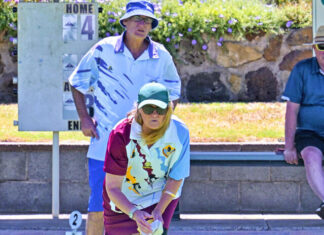Andrew Mathieson
NO ONE knows the tales of the sea quite like 85-year-old Bill Huggins.
The Ocean Grove RSL sub-branch president has seen young men die in it, saved others from the treachery of it and, throughout it all, has lived beside the sea.
Growing up, his father was a water bailiff enforcing laws along the Murray River.
Bill picked fruit and milked cows until he was old enough to join the war effort.
“If you have any doubts about the 32 and a half years I served in the navy, this is my history sheet,” he is quick to point out.
“You’ll find that I served on about 40 different warships in that time.”
He hands over a thick file full of papers, documenting his time since joining the navy on July 8, 1940, until retirement on January 9, 1973.
Bill’s service took in two major conflicts: the Second World War, soon after the 18-year-old enrolled, and Vietnam, which ended after his 50th birthday.
As an operating carrier, Bill’s first ship was HMAS Sydney, which operated as a troop ship, transporting battalions between home and hot spots.
One year – Bill thinks it was 1942 – he travelled 160,000 miles on the vessel.
“I spent a lot of time on the ship and after a few trips they were classified and that’s where I got this bloody lymphoma from,” Bill explains.
He regretfully points to a gland protruding from his neck, a memento, he says, of the Vietnam war.
But Bill’s smile returns immediately as he proudly exhibits an array of war medals and ribbons from tough campaigns in Burma, Malaya and Papua New Guinea.
“I love the Burma ribbon because it was a lovely brown but you can’t wear the Burma and a Pacific ribbon together,” he says.
“You’ve got to wear the one you got first.”
Protocol dictates Bill can only wear his Pacific ribbon in parades.
Among his toughest assignments was Rabaul harbour, in Papua new Guinea.
Bill had to clear the mines at the end of the war after the Japanese occupation.
He flippantly today laughs off the dangers.
“We use to go for walks there on a Saturday afternoons,” Bill tells.
“For us, it was like going to a (movie) matinee.”
But war affected Bill immensely.
He lost a lot of good mates.
“They were closer than brothers, actually, because you live in their pockets and you know everyone’s weakness and their strength,” he says.
“You talk about things that you wouldn’t talk about with your own brother, really.
“My brother did fight with the 49th Battalion at Kokoda and he doesn’t talk about the war.”
Bill recalls when more than three-quarters of his own naval depot class was found at the bottom of the sea in March, 1942, after HMAS Yarra and HMAS Perth were sunk off the Java coast.
“A helluva lot of my friends in the communications branch were killed in it,” Bill regrets.
“It was their first trip to sea – it’s not fair.”
Bill left the service but stayed close to the sea.
He was the Point Lonsdale lighthouse keeper for the next 14 years – and its last – until 1987 after he “thought he had to do something to fill in the time”.
Bill also rode the last trip of the famous Queenscliff lifeboat in 1976.
Part of his work was rescuing sailors from the dangers off Port Phillip Heads.
“We did a lot of rescues outside the harbour,” Bill remembers.
“We’d be out searching for ships that should never be out there.
“Almost on every occasion we’d get a fictitious Mayday call.”
Bill has since spent nearly 15 years with Ocean Grove RSL sub-branch.
Bill hopes his legacy as president will be success in his work advocating for greater involvement among the young in Anzac Day turnouts.
“I just hope we’ve tried not to be a group of old men locked in a room,” he grins.
The old man and the sea
Digital Edition
Subscribe
Get an all ACCESS PASS to the News and your Digital Edition with an online subscription
Finals make-up looks set with one round to go
The final four of the Geelong Bowls Region Premier Pennant competition seems set with one round to go in the final home and away...








